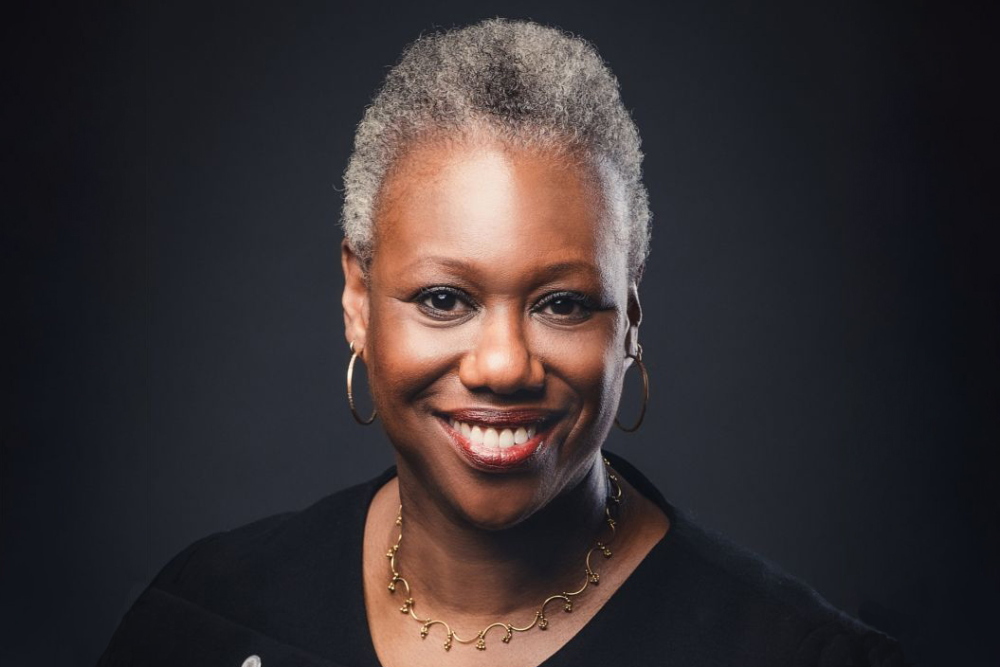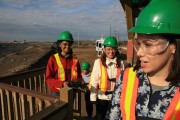Over the last two years, the Pembina Institute has examined the barriers to gender equity in the energy sector and has proposed solutions to be adopted by the province, federal government and leaders. This series of interviews celebrate women advancing Canada’s transition to a clean economy and offers their insights into the opportunities to make the net-zero future one where all Canadians can participate and lead.
Heather Campbell has had a diverse, three decades long energy career in a full range of energy industries.
She holds a Bachelor of Engineering Science degree in Biochemical and Chemical Engineering from Western University in addition to a Master of Laws in Energy Law and Policy from the University of Dundee. She is a licensed professional engineer practicing in Alberta, Canada.
Heather is an engaged, lifelong community volunteer, actively sharing her talents, resources and time by participating and often leading a purposely diverse range of organizations. She is a board director with Calgary’s performing arts centre, Arts Commons, member of the Advisory Council for Western Engineering, and Commissioner with the Calgary Police Commission. She performs two clean technology advisory roles: an advisory council member of the B.C. Centre for Innovation and Clean Energy, and an advisory board member of the National Research Council of Canada's Industrial Research Assistance Program. Heather is the former co-chair of Alberta’s Anti-Racism Advisory Council and has been awarded the Queen Elizabeth II Platinum Jubilee Medal.
Why is the energy transition important to you?
Clean technology addresses sustainability while creating opportunity for economic diversification in Alberta. We need to consider more than just achieving net-zero, we need to establish a mindset and the tools to stay there. The conversation on net-zero is currently focused on strategies, tools and concerns about the pace of change; it needs to also focus on behaviours and values to enable net-zero. As a result, I’m proud right now, that I can contribute to a productive conversation about a just energy transition. A just energy transition is central to the manner in which I choose to lead within the clean technology sector.
Every single board table is big enough to accommodate diverse voices. No one is left behind in a just energy transition. Alberta can actively deploy the same skillsets in a just energy transition that it has done so successfully in oil and gas development.
Ensuring that Canada’s, Alberta’s and Calgary’s energy transition is authentically inclusive and is prioritized is challenging to achieve. Having incremental women in STEM fields and especially in engineering, in my view, will facilitate women participating in and leading the energy transition. Women are drawn to clean technology in a high percentage, relatively speaking, but are still significantly under-represented in clean technology overall.
There is a need to ensure the future clean technology and energy workforce is inclusive and enables equality globally. This isn’t solely about reducing emissions, which is why transition is by no means a simple or inexpensive endeavour. Clean technology addresses sustainability while creating opportunity for economic diversification in Alberta and across the world. Alberta has all the tools to do that well when we do it inclusively.
What are the key challenges you’ve faced in your career, and what are your thoughts on their solutions?
Representation. Intersectionality.
It is important for me to be both seen and heard. I use my voice to advance the conversation on inclusion.
Let’s talk about income gaps and ways to have women participate in and lead Alberta’s energy transition. Every year, as a licensed professional engineer, I receive information from APEGA’s salary survey that tells me how much less I am compensated as a woman than my peers. The year 2021was the first time that APEGA data showed that industry closed the gender wage gap, but only for engineers-in-training. Notwithstanding the incremental work to do on pay equity, this is one positive development.
Up to 2021, from day one, the day they sign they employment contract, women engineers were compensated 2.4 per cent less than their male counterparts in Alberta. From day one. Of course, what’s missing from APEGA's analysis are the intersectional realities. I live those intersectional realities as a Black woman and as a professional engineer. Intersectionality – not a kooky academic theory– factors into my daily living and my compensation. I know it, I feel it, but I have no quantitative data that demonstrates it.
A discussion of gender as a Black woman must include a discussion about equal pay and wage gaps. We don’t collect race-based data in engineering that would accurately articulate the substantial wage gaps that still exist in our regulated profession. No person wants to work in a situation where they are unfairly compensated – no one. We will have difficulty, consequently, in attracting young people into industry if we don’t deploy social justice principles and equitable strategies. It is young people, after all, who are positioned to solve our most serious challenges – like climate change.
When we discuss that there is a “dearth of talent”, is that truly the case or have we failed to develop people in racialized communities, missed the opportunity to present engineering as a reasonable option and career path to all students who show an aptitude for math and science, and do we overlook diverse communities when searching for the skillsets that are needed?
How are we incorporating Indigenous ways of knowing and doing into our engineering curriculum and technical evaluation tools?
Being inclusive within our engineering practice requires us to see and take other perspectives into account and is ultimately essential to the future success of our profession.
What does a successful energy transition look like to you?
A successful energy transition will be inclusive.
A successful energy transition will shift the metrics of energy systems and consider metrics like energy equity, energy independence and energy access, along with sustainability, cost, reliability and resilience.
A successful just energy transition will have energy as a tool for reconciliation rather than a legacy arm of colonialism.
A successful just energy transition will require that innovators and the energy sector communicate effectively and transparently.
It will require the energy sector to include an anti-racist and inclusive lens on their ideas and designs. The energy transition will be successful when critical questions are asked.
Who by the nature of your work will potentially be marginalized?
Who will be excluded?
How are you authentically advancing equality?
A successful just energy transition will leave no one behind.
Lightning round
What book is on your nightstand?
This is really embarrassing but it’s The Energy Efficiency and Renewable Energy Handbook. Second Edition. You can only be knowledgeable and expert in so many things so it’s a regular reference for me.
What is the proudest accomplishment of your life?
I am a breast cancer survivor.
If you were granted one wish to make the world a better place, what would it be?
The elimination of systemic racism and poverty.
Describe the future of energy in one word.
Innovative.
This profile also appeared as part of the Women in Energy Transformation Series, a series of four national dialogues co-hosted by the Pembina Institute and GLOBE Series. You can view the rest of the profiles here.
The Pembina Institute also wishes to to thank the McConnell Foundation and Women and Gender Equality for their generous support of Pembina’s ongoing work on advancing gender equity in energy.







